
Climate change is sweeping through our lands and lives. The reality is that since 2012, the Asean region has experienced 4,819 episodes of floods, cyclones, severe storms, droughts, and other climate-related disasters, as reported in the Asean Disaster Information Network (ADINet).
Given this situation, the Asean disaster management machinery had already been mobilised; it was the first entity to enact a regional agreement. The work programme of the Asean Agreement on Disaster Management (AADMER) currently covers 2021-2025 and supports the Asean Vision 2025 on Disaster Management. However, if global warming carries on unchecked, these efforts alone will not be enough. Sadly, the population in Southeast Asian countries will continue to experience an alarming increase of 40% in weather-related disasters. The resulting damage and losses incurred in any disaster will have a ripple effect and retard the development of the affected areas.
Asean, with its vision to be the global leader in disaster management and emergency response, continues to rise to the challenge. We have already learned from the Covid-19 pandemic that disaster risks are not always isolated. The pandemic taught us how interconnected risks from climate hazards and non-climate factors have a cascading effect across multiple sectors in the region. While we have weathered the pandemic, climate change risks such as an upsurge in losses and damages due to disasters, food and water shortage, and population displacement have been projected by the Intergovernmental Panel on Climate Change (IPCC), if no action is taken to reduce greenhouse gasses emission worldwide. Therefore, the next move is to enhance the capability of the region as a whole to contain these disasters and recover appropriately from their effects.
Moving forward, Asean members need to embrace this challenge by working together towards a more effective and holistic, or whole-of-Asean approach, to better manage future disasters. To this end, the Asean Disaster Resilience Platform (ADRP), formed in 2021, is an innovative instrument that will bring Asean decision- and policy-makers and relevant Asean sectoral bodies together to focus on ways to overcome disaster risks and build resilience. The whole-of-Asean approach could only be achieved effectively by working as a united entity with cross-sectoral bodies from various areas; notably, from the three pillars of the region: the Asean Political-Security Community, the Asean Economic Community and Asean Socio-Cultural Community.
Discussions on how to achieve this goal will be facilitated at the inaugural biennial Asean Disaster Resilience Forum (ADRF), co-organised by the Asean Committee on Disaster Management, Asean Secretariat, Asean Coordinating Centre for Humanitarian Assistance on Disaster Management (AHA Centre) and hosted by the Singapore Civil Defence Force (SCDF), to be held on Aug 22-23 in Singapore. It will bring together key bodies from the aforementioned three pillars to assess, review and shape effective disaster resilience programmes. The potential of partners in science, technology and innovation, as well as socio-cultural, economic and financial agility in the region, will be leveraged to promote strategic public-private partnerships. Senior and high-level officials from Asean member states and Asean dialogue partners, and representatives from UN agencies, multilateral financial institutions, private sector entities, philanthropic organisations and other non-Asean institutions will exchange experiences and chart the pathway for disaster resilience in the region.
Aptly themed "Mobilising Asean and Its Partners on the Journey towards Building a Disaster Resilient Asean Community", this event heralds the future for cohesiveness in steering the building of a successful and sustainable, disaster-resilient regional community.
Joy Jacqueline Pereira is Professor at Universiti Kebangsaan Malaysia's Southeast Asia Disaster Prevention Research Initiative (SEADPRI-UKM) & Co-Chair of the Intergovernmental Panel on Climate Change (IPCC) Working Group on Mitigation of Climate Change.